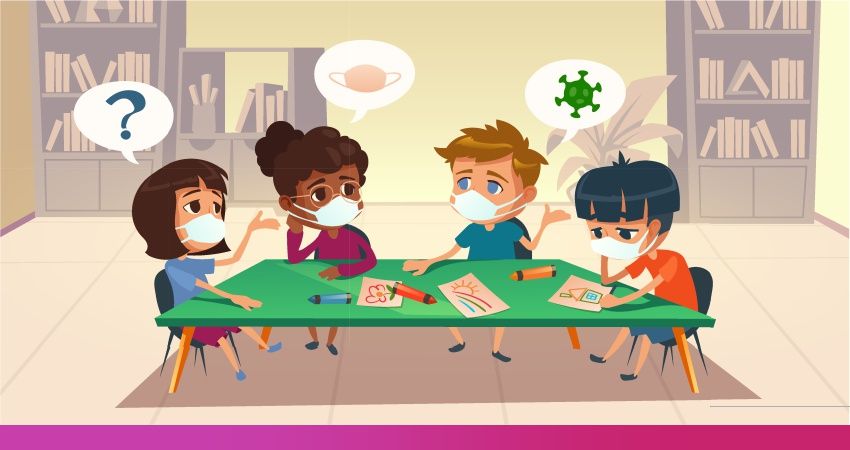What to Do When My Kid Doesn't Want to Study?
Monisha |
Parents Corner |
2024-08-09 |
null mins read

Table of Contents
Every child is unique, and hence every child needs a different environment to reach his potential. Living in the times today, when everyone around us seems to be a competition, it becomes tough to lift the excess burden to study rigorously. Even adults face such kind of pressure in day to day life, whether it’s about office performance or keeping up with social media.
Similarly, kids today are also surrounded by various forms. There is constant pressure on them to perform better in every aspect. Some kids are blessed with the right concentration and learning skills, and hence they find it easy to learn more. While in other cases, this constant pressure on some kids often drifts them away from studies. They find it hard to focus and don’t want to study. But the question arises on how to develop an interest in studies?

Education in the initial years of learning plays a crucial role in the holistic development of a child. Most of the right habits and social etiquettes are formed in these foundational years. But what to do when the poor concentration skills of your kid take over his initial learning experience, and your child doesn’t want to study?
This can become a significant concern during good parenting. But what to do to enhance a child’s desire or motivate the child and his ability to learn? Well, as they say, nothing is impossible for parents. There are always some proactive steps that you can take to help your kid develop better study habits and learning skills.

This article covers specific steps and measures that can help you if you find yourself in such a position.
9 Tips for When a Child Doesn't Want to Study

1. Acceptance Before Expectations
As parents and facts of good parenting, we have a lot of expectations and hopes from our children. We want them to be happy, healthy, and prosperous in every aspect of their life. But make sure that your expectations don’t act as an unnecessary burden on your child. If he is not good at studies, accept it, and make yourself comfortable. This will motivate your child to work harder. Define your idea of success with them and make them enjoy learning without burdening them. This will give you answers to how to develop interest in studies.
2. Look Out Of Their Interests
Education or the ideas of learning are different for every individual, but the environment of learning that we provide is relatively rigid. They go to school, study, follow a scheduled timetable, do specific assignments, learn certain topics, and get promoted based on their performance. But maybe, this is not working for your child. If he finds doing chores boring and shows no interest in the topics taught in school, expand your approach by considering his topics of interest. For instance, if your kid gets excited about planets or animals or nature, or if your child likes to listen to stories and respond well to them? Figure out their interests and take time out to pursue them. This will engage your child in learning more about such subjects, and he will end up attaining better focus.
3. Encourage Their Curiosity
Curiosity is like kids. They are always curious about everything that surrounds them. Their growing years are all about what, why, and how. Because of good parenting, you can harness their curiosity, motivate children, and give it the right direction. Provide them with the freedom to find answers on their own. Allow them to wonder about topics independently. Answer their question with a question. This will engage your kid’s mind, and he will be curious to study more things. Don’t get irritated over your child’s tendency to ask “why?” Always answer with patience.

4. De-Emphasize School
School is the centre point of learning in the initial years of your child, but it should not be the end-all of learning. Don’t get disheartened over the school performance or teacher’s review of your child’s account. If your child doesn’t like studies, there are chances that his performance at school will not be satisfactory. This is because every child needs a different environment to thrive. Traditional methods of schooling do not need to be enough to engross your child into learning.
Give your children the freedom to follow their interests. Handle their test anxiety patiently and avoid taking an angry approach. This will divert them further from studies.
5. Make Studying Enjoyable
Kids follow things that seek their interest. Ask them to study with the help of diagrams or cartoon pictures. Draw mind maps or thought charts. Please provide them with coloured pens and encourage them to enjoy their studies. Be creative to attract their attention to reviews. This will help them in enjoying the process rather than avoiding it. Follow good parenting and know the difference.
6. Learning Together
Just like the family eats together, celebrates together, make sure to learn together. Read exciting books, watch documentaries on exciting subjects, go to museums and the zoo. Show enthusiasm towards learning new things and explore education tools and your child will follow you.

7. Minimize distractions
Technology resides with us. From the time we wake up till the time we hit the bed, we are surrounded by technology. And since kids form habits quickly, they often get attracted to these gadgets. They like playing video games over the phone or TV consoles; they like watching movies and browsing the internet. Keep an eye on their screen time and pay attention to such habits. Make sure that your kid doesn’t spend much time on mobile phones. Minimize distractions to help them focus on their study.
8. Stay Positive
Focus on the strengths of your child rather than weaknesses. Promote a positive learning approach that emphasizes on capabilities. If your child is not interested in a particular subject, find another way to seek his interests. For instance, if your kid is weak at maths, follow approaches that are different from the traditional ones. Watch videos on the internet, or teach them while playing or buying them chocolates. Similarly, if your kid is interested in language ad writing, encourage him or her to learn more about it. This will promote progress, and your child will develop a sense of self-belief that will lead him to seek other realms of knowledge too.
9. Don’t Shy Away From Seeking Professional Help
As we have said before, every child is unique, and their needs differ accordingly. While it is entirely okay to feel distaste towards school and education, but in some cases, there can be more than meets the eye. Some children struggle with learning disabilities that make things more difficult for them. If you feel that your child is showing traits of some disabilities, consider seeking professional help as soon as possible. Disabilities like attention-deficit/hyperactivity disorder (ADHD) and dyslexia are common in children, but they are manageable. Get your child the desired treatment and help him develop their learning skills.
Related Blogs
Does Acadamic Achievement Matter: So, what can we do as parents to help our children achieve academic success?
Names of Shapes with Pictures: Let's dive into some shape names and pictures of the same.
Extracurricular Activities for Students: Extracurricular activities are a crucial component of the experience for students.
Qualities of a Good Student: It takes a lot of hard work to learn all the qualities of a good student.
FAQs for Kids and Parents: Prepare your kid with these admission questions and answers.
Why is Your Child Hyperactive: Practical Tips to Control a Hyperactive Child
Other Related Sections
NCERT Solutions | Learning Concepts I Sample Papers | CBSE SYLLABUS | Calculators | Converters | Stories For Kids | Poems for kids I Practice Worksheets I Formulas I Parent Resources

